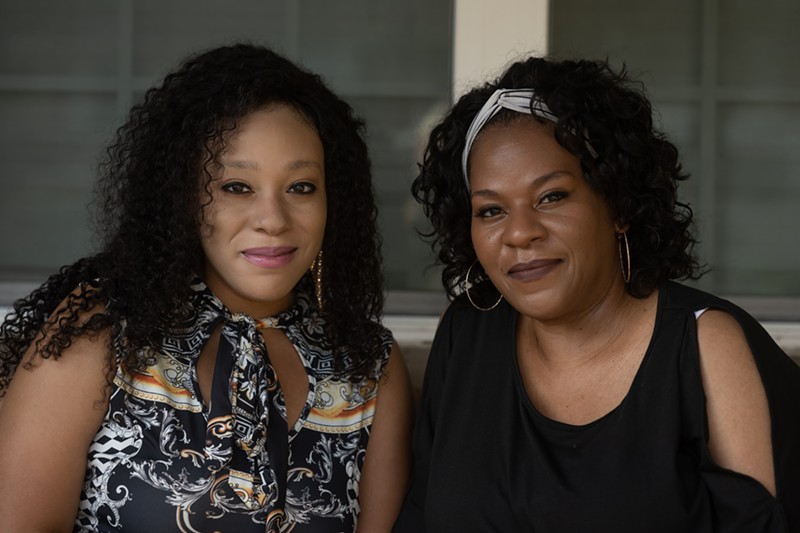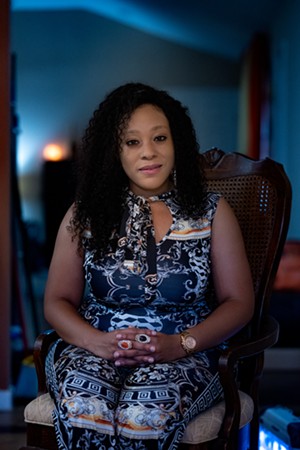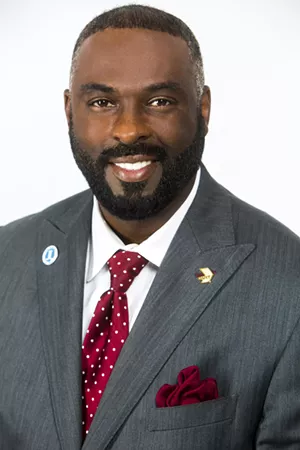An Oak Cliff native, she'd been on the run for about a year, she says, because of sexual and mental abuse and had just returned home from Colombia, where she'd spent the past year living under an assumed identity as 22-year-old Tika Lanay Cortez. She was also pregnant.
“Everyone's bad when they're little,” her grandmother told the Observer in early January 2012 shortly after her daughter’s return.
Jakadrien was arrested in early April 2011 at a mall in Houston for shoplifting. She gave local and federal law enforcement officials a fake name and told them she was from Colombia, so after she made bond, they sent her to immigration officials who, a month later, deported her to South America. They claimed they believed her because Jakadrien never deviated from her lie, CNN reported. Her lawyer at the time rejected the government's claim.
“I don't buy that she had the wherewithal to be able to bamboozle the government,” her family's attorney, Rayshun Jackson, said in one of several interviews with CNN. “You know, kids are scared when they get around authorities. … To think that you could bamboozle them to create a new identity, it just doesn't make sense.”
A graduate of Thurgood Marshall School of Law in Houston, Jackson, who's now 51, seemed like the kind of prominent attorney you'd want on your side in a fight with the U.S. government. He'd made several top attorney lists, including D Magazine's in 2006. He'd served on the Dallas Area Rapid Transit (DART) board since 2017. Jackson claims to have represented some high-profile clients, including former Dallas Mayor Pro Tem Don Hill in what the Observer described “as the largest federal corruption case in the history of Dallas.” Convicted in 2009 for bribery and extortion, Hill received an 18-year prison sentence and died of prostate cancer in 2017.
Representing Hill and Jakadrien aren't Jackson’s only steps into the spotlight. He’s also a self-published novelist who used those two cases as a foundation for his first book, much to the displeasure of Jakadrien and her family, who claim he was more interested in milking the case for media attention than Jakadrien's welfare. More recently, he returned to the headlines in April, arrested and accused of laundering “what he believed to be proceeds of narcotics trafficking,” announced Acting U.S. Attorney Prerak Shah in an April 16 press release."I don't buy that she had the wherewithal to be able to bamboozle the government." - Rayshun Jackson, attorney
tweet this
“Attorneys swear an oath to conduct themselves with integrity and uphold the rule of law,” Shah said. “Mr. Jackson instead chose to ignore his oath by allegedly laundering money for purported narcotics dealers. He explicitly instructed them on how to further violate the law and profit from the devastation of our nation's opioid epidemic, lining his own pockets in the process. He will now have to face the consequences of his actions.”
Before his own arrest, though, Jackson freely offered his expert opinion about Jakdrien's case to media outlets around the country. “Tex. Teen mistakenly deported to Colombia assumed a false identity” read a Washington Post headline. “American Teen Mistakenly Deported to Colombia Arrives Home,” NPR wrote. CNN headlines included “The harrowing journey of the girl who called herself Tika Cortez,” “Texas teen mistakenly deported will be handed over to U.S. officials” and “Teen mistakenly deported to Colombia.”
Just like the Observer, they were all asking the same question: “How could this happen?”
A month after her return, Jakadrien and her mother headed to New York with Jackson to explain what had happened to CNN's Soledad O'Brien. She never mentioned the sexual abuse or the sex trafficker who sold her body for sex in Houston. Instead, when O'Brien continued pressing her about whether she told immigration officials her real name, Jakadrien said, “I've told three immigration officers that I was Jakadrien Turner but after that, I just gave up. It felt like I didn't have any more chances.”
Speaking with Houston's KHOU in February 2012, Jakadrien compared it to “the story of the boy who cried wolf. I've lied multiple times before. I've never been honest. I've made a lot of stories up. I made the name up 'Tika Cortez.' But at a certain point, I just gave up because I said multiple times: 'I'm Jakadrien Turner, I'm 15 years old, and why am I here?'”
Nine years later, and a few months after Jackson's arrest, Turner says those were lies. The truth is that she never gave Houston police or immigration officials her real name. She wanted to go to Colombia to escape sexual abuse at the hands of her stepfather. “[It was] a trained interview,” says Turner, who is now 25. “Jackson and his assistant trained me what to say. He was saying that it will make me look like I wanted to go [to Colombia] and look like a liar and told me not to say that. … I felt dismissed. As a grown woman, I don't understand it. [As a teenager] I thought maybe they're right. But I shouldn't have lied to the media.”
**
In late October 2010, Jakadrien ran away for the first time, with a boy in high school. She told him she was unhappy at home, and he agreed to hide her at his home. At 14 years old, she'd spent her life in Oak Cliff and much of that time at her grandmother's business, a hair salon called Care Is ... Beauty. Her mother, Johnisa, had also worked there while Jakadrien was growing up before she moved on to a larger salon with a larger clientele. When Jakadrien was 11, her mother renewed a relationship with an old high school flame and married him when Jakadrien was 12. A few years later, Jakadrien had gone from an honors student to a below-average one who had a reputation for acting out and “indulging in activities” like smoking marijuana and creating multiple social media profiles seeking attention. Her behavior, she says, was partly a response to the abuse she was suffering at home from her stepfather, Rodney Eugene Turner. “He was threatening me,” she says, “and made me believe that it was normal. I had a low self-esteem and needed some kind of male figure, so I went along with it and never said anything.”
After her first time running away, she missed school for a few days, got nervous and returned to class only for a teacher to call Jakadrien's mother and report that her daughter had been found.
A week later, she ran away again with a friend. This time she didn't return for 14 months.
“I had knots in my stomach and in my throat,” says Johnisa. “I wasn't sure what had happened. So many things were going through my mind.”
Jakadrien and her companion sought refuge with another friend who lived at the West End Marketplace in Dallas. Not long after she left, she went to a Mavericks game and met a man who introduced himself as a 19-year-old named Anthony. He was charming and seemed genuine. He claimed he was from Arkansas and staying with his grandparents in Dallas. He said he was a promoter and sold T-shirts and merchandise at concerts and events. After a short time dating, he invited her to go with him to Houston, a city known for sex traffickers, according to Harris County District Attorney's Office. “Sex trafficking in Houston is an epidemic,” Harris County DA Kim Ogg told Channel 2 NBC in March 2017.
Instead of taking her to a nice home as he had promised, Anthony took her to an apartment in Houston. There, Jakadrien says, a female accomplice beat her and told her that she was going to start prostituting for them. For two months, they made her sell her body for sex. They set up the sex acts to occur in her clients' cars so Jakadrien couldn't escape. They controlled when she ate, bathed and went to the restroom. She once managed to sneak a call to her mother. “She left a message apologizing for being away from home and said when she'd gotten enough money, she would be home,” Johnisa says. She told the Dallas police detective assigned to her daughter's case about it, but Johnisa says that the detective wasn't helpful and didn't seem to take it seriously.
A “john” helped Jakadrien escape. Jakadrien says that she'd gotten into his car for sex but instead, she told him her story and asked him to help her. The john, who was from Colombia, took her home to his apartment, and she cut off all communication with her sex traffickers. She spent about a month on his couch trying to figure out how she was going to get back to Dallas and had gone to Greenspoint Mall in the Greenspoint neighborhood of Houston where she stole about $50 worth of merchandise in hopes of getting a bus ticket. Houston Police officers picked her up for shoplifting and carted her to the city jail. She told them her name was “Tika Cortez” and that she was from Colombia."A lot of children and kids get nervous when they get in trouble and don't want to get caught." - Jakadrien Turner
tweet this
“I literally just made it up,” she says. “I don't know where it came from. A lot of children and kids get nervous when they get in trouble and don't want to get caught. That was where I was at, at that time. I go into the lie and make more lies. I was scared. I'd never been to jail.”
It turns out Tika Cortez was an actual person from Colombia, and when a Colombian official showed up to interview her, Jakadrien continued her charade, agreeing that yes, she was indeed “Tikithia Cortez.” Jakadrien didn't speak Spanish but says it was easy to convince the Colombian official because he kept giving her details about Cortez.
A Houston judge sentenced her to time served for her misdemeanor theft charge, and Harris County Jail officials handed her over to federal immigration officials who, in turn, took her to an ICE detention center. She was housed in a cage with women of all different nationalities and remained with them for about a month before immigration officials shipped her to Alexandria, Louisiana, to be put on a flight to Colombia.
“I was so afraid and just going along with the lie,” she says. “I was just afraid of the outcome and the consequences, which is why I didn't speak with anyone [there]. Being free in the streets, where would I be at anyways? I would have been in danger. I was actually … safer in the facility. It kind of saved me.”
**
In late May 2011, Jakadrien found herself at a halfway house in Colombia, surrounded by people from Africa, Cuba, Russia and the Middle East who were trying to get their papers in order so they could start their new lives in a new home. The halfway house was a two-story home, she says, with gold decorations on the stairs and around the ceiling and wood floors. The men slept downstairs, and the women lived upstairs.
“I am in a place of feeling like I am traveling everywhere,” she recalls. “It was like a new setting, a different experience, a different culture. Everything is different. Here, you can't just sit in the grass and enjoy it without getting bit up by fire ants. But there you can sit in the grass and lay there for days.”
She was only 15, but everyone thought she was in her early 20s. Officials at the halfway house found her a job at a Sprint call center. She began learning Spanish and eventually sparked a romance with a Cuban at the halfway house. He was in his early 30s with long dark hair and bright green eyes, charming and attractive but a good person, she maintains. Their love grew as she adjusted to speaking Spanish. Soon, she was pregnant.
About eight months passed at the halfway house, and the woman in charge noticed Jakadrien was getting sick in the morning. She took her to a doctor who verified the pregnancy with a blood test and then sent Jakadrien to stay at a women's shelter. But she wasn't there long before she was sent to a shelter for teen mothers where she met with a U.S. embassy official who told her he knew who she was and that her mother missed her.
Her grandmother Lorene had been searching for her every day on social media. “I couldn't stop,” she says.
One day, her hunt paid off. She saw a photograph of someone who looked like Jakadrien. The person in the photograph was in Colombia and looked thicker than Jakadrien, Lorene says, which made her think maybe her granddaughter was pregnant. “I contacted the police investigator in Dallas, and she told me that she couldn't talk to me because I wasn't the mother,” she adds. “...They thought I was crazy because I said that I [had] found her in Colombia.”
Not long after she discovered the photograph, she was crying in her salon when one of her regulars came in and noticed. “Mrs. Turner, what's wrong?”
“Nothing, just having a bad day,” Lorene recalls telling her.
“You can talk to me,” the customer said.
Once she started telling the story, Lorene couldn't stop. After she shared everything about her granddaughter, her client told her that she was taking a class with investigators and would have one of them reach out to her.
Ten minutes later, a law enforcement official called her and then came by the salon so she could show him what she had discovered. He saw what she saw. It was her granddaughter.
“Everybody thought I had lost my mind,” she says.
Back in Colombia, the U.S. embassy official told Jakadrien that he was taking her home. She didn't have anything left for her in Colombia. The father of her child, she says, wanted her to get an abortion because neither of them could afford the child. She never told him her real name or that she was only 15. He found out like the rest of the country: on the news.
And while part of her missed her grandmother and her mother, returning to the U.S. also meant that she would be returned to her stepfather and the sexual abuse.
“I wasn't afraid at that point,” she says. “I was thinking of needing my mother to guide me emotionally through this experience of a baby growing in me. I was hoping it would be different [with my stepfather] because I was pregnant.”
It wasn't.
**
She’d left the U.S. shackled in an airplane, but the flight back was different. Reporters with cameras were waiting for her, as was her mother, grandmother and her family's attorney Ray Jackson. But they weren't just waiting for her at the airport, TV news vans lined the street of her neighborhood in Oak Cliff, and reporters stalked her for photographs for about two weeks after her return. “I felt like a celebrity,” she says.
Amid the media frenzy, she says, Jackson saw an opportunity. Jakadrien's grandmother Lorene was the one who called and told her about Jackson, who represented the family in a civil suit against the government. Lorene says a local TV reporter had recommended him after their interview. “She told me that I needed an attorney before it hit the big news, so Jackson came to where I was at the beauty shop so I could sign some papers, but I couldn't sign them because I wasn't the mother,” she says. “And then after the interviews, he threw us under the bus.”
By that time in 2012, Jackson had already made a couple of “best of” attorney lists and divorced his wife Brenda Teele, a former WFAA news reporter. He declined several requests for an interview, and Teele never responded to inquiries.
Jakadrien's mother thought he was OK. “We were at the airport, and he seemed engaged and concerned about us taking the proper steps to proceed with getting her home and getting her some help,” Johnisa recalls. “I was really concerned with her head space.”
Lorene wasn't sure what to think about him. She says that after he took over, Jackson sidelined her. One of her cosmetology friends saw that Jackson was representing Lorene's daughter on the news, called and told her, “'You know he is crooked,'” Lorene recalls her saying. “But when I read up on him, he is supposed to be one of the best attorneys in Dallas. … I just thought it was people saying that. People are always talking about people.”
Meanwhile, Jakadrien didn't know what to think. One minute she was in a shelter for teen mothers in Colombia and the next she was on Channel 8 with Rebecca Lopez and heading to New York to appear on CNN. News reporters from around the country wanted a slice of her trauma to share with their viewers.
She recalls Jackson taking her into his conference room at his office, which was then located on Turtle Creek Boulevard and Haskell Avenue in Dallas, and coaching her on what to say to reporters. She says he told her to tell reporters that she had, in fact, given her real name to immigration officials. She admits it was a lie, but she repeated the line several times.
“I felt like because I had lied about my name, people would think what I did was wrong,” she says. “People would look at me like this fast girl.”
Jackson filed a civil lawsuit on behalf of Johnisa against former U.S. Attorney General Eric Holder and Secretary of Homeland Security Janet Napolitano. In the lawsuit, Jackson argued that it shouldn't matter that Jakadrien had given a false name because she was listed on the National Child Runaway list and her birth certificate was on record in Texas. He claimed people often give fake names to ICE officials to avoid deportation. “It is still unclear why ICE officials failed to confirm (her) identity with fingerprint analysis, genetically specific markers that suggest a person's origin, or other methods more definitive than just having a name and no documentation proof of her alleged Colombian citizenship during these hearings,” he wrote in the May 2012 lawsuit.
In January 2012, ICE responded to the Los Angeles Times and claimed officials followed proper procedure and checked the criminal database and completed a biometric verification. “She maintained this false identity throughout her local criminal proceedings in Texas where she was represented by a defense attorney and ultimately convicted by the state criminal court,” the ICE spokesperson said.
Jakadrien's mother, though, worried about her daughter's mental health more than Jackson's media mission or the civil lawsuit. At first, Johnisa says, she assumed he had her daughter's best interests at heart, but then he started skipping scheduled meetings at his office. In ICE interviews, Jakadrien had to relive some of the most difficult parts of her life, but Jackson and his assistant would sit at the table “laughing and talking about other things,” Johnisa says.
When Jackson tried to book her daughter on the Dr. Phil show, Johnisa had enough of the media circus. “I wasn't on board,” she says. “My daughter was scared to go out, and she was hiding in the house because the media was all over our street. That was a continuous trauma. I was trying to get her in a good head space, and once he saw that I wasn't on board with all the media, he kind of lost interest.”
**
Nearly a decade later, Jakadrien is in a better place now. She’s focused on the future instead of the past. She says she has finally overcome the trauma she experienced as a child and found a way to smile again. She married a man who cares for her and had another child with him. Her oldest child is 9 years old and resembles her father from Colombia.
Jakadrien's stepfather was arrested in late 2014. In August 2015, he pleaded guilty to prohibited sexual contact as part of a plea deal. The court later sentenced him to 20 years in prison, where he is today. When he returns to the outside world, he’ll have to register as a sex offender, according to court documents.
A year after her stepfather's conviction, Jakadrien's mother told her that Jackson had written a self-published novel centered on her case. In his telling, Jackson had based the main character, Reece Ryan, on his life as a successful Dallas attorney. “I took those things and created this caricature that's much better than I am,” he told The Dallas Morning News. “From there, I wanted to take some of my real-life experiences or cases. One being the Don Hill case that involved city corruption and bribery, extortion. And the other involving a 15-year-old who had been deported to Colombia and kind of utilized those cases as a base for my storyline. And then it kind of warped into something that was much bigger and different than those.”
Jackson never asked Jakadrien for permission, she says. Nor had he offered any kind of financial compensation in exchange for using her story. “He's an opportunist and not a person who wants your best interests,” she says. “I knew that he was going to do that. I closed the [civil suit] case, and he didn't get no money from me. So that was his way to get it off me.”
Jakadrien's mother bought the novel, but she couldn't bring herself to read it.
“I read the preface, and I was pissed,” she says. “That wasn't his place because I told him when we were going over the case details that nobody can tell her story better than she can. She is the one that lived this. … He was saying that this could be a big deal, and I told him that is not my concern. My concern is just to get her well.”"I read the preface, and I was pissed." - Jakadrien Turner
tweet this
Since 2009, the State Bar of Texas has disciplined Jackson with a couple of public reprimands and several probated suspensions for failing to pay clients or give them an accurate accounting of funds they had and for failing to notify a federal judge about his suspension and practicing law nonetheless, according to court documents. His last suspension ended in late July, a few months after federal authorities arrested him on money laundering charges.
In a late April dispatch by Dallasjustice.com, defense attorney Michael Lowe points out that the fact that Jackson is a lawyer and appeared on the DEA's radar during an ongoing investigation doesn't bode well, especially given how detail-oriented federal prosecutors are before they take a case to trial. “However, barring some kind of miraculous entrapment defense — and assuming the facts in the affidavit are true, I can't imagine how it's possible Ray Jackson could go to trial and get a not guilty verdict from a jury,” Lowe says. “Look for a plea deal.”
When Jakadrien's grandmother read that Jackson had been arrested, she says, “I was so happy. I'm so sorry to say that, but I did a Holy Ghost dance.”














